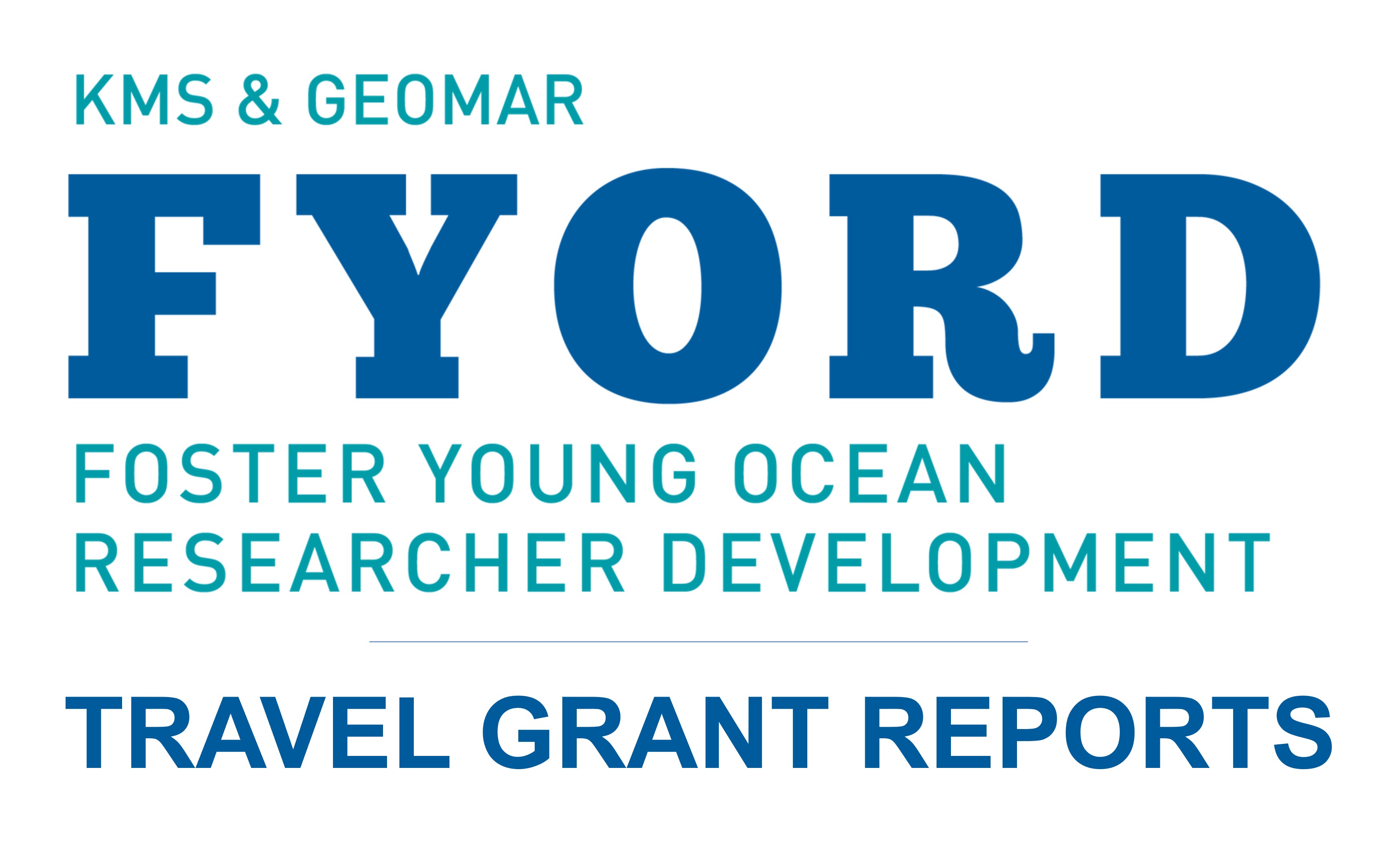EGU General Assembly
In the beginning of springtime in Vienna, Austria, as every year, thousands of geoscientists met for the EGU General Assembly 2025. And thanks to FYORD, I, Lenya Baumann, got the opportunity to be part of it. Studying geophysics and working as a student assistant for the group ‘Marine Geophysics and Hydroacoustics’ at Kiel University, I was interested in taking part in a scientific conference and seeing the variety of geosciences at EGU. During my Bachelor’s thesis, I analysed the bathymetry of the shelf in front of a fast-melting glacier in East Antarctica and was happy to present my geomorphological results as a poster at EGU.
The EGU was my first conference, and before it started, I couldn’t really imagine how it would be to join a conference, especially with 20,000 people. So, it was helpful to get some great tips and insights by enrolling in the mentoring program at EGU before the event itself. In the programme, each mentee (first-timer) is assigned to a mentor whom they can reach out to before and during the conference. Additionally, there’s an online meeting offered to get an introduction to EGU.
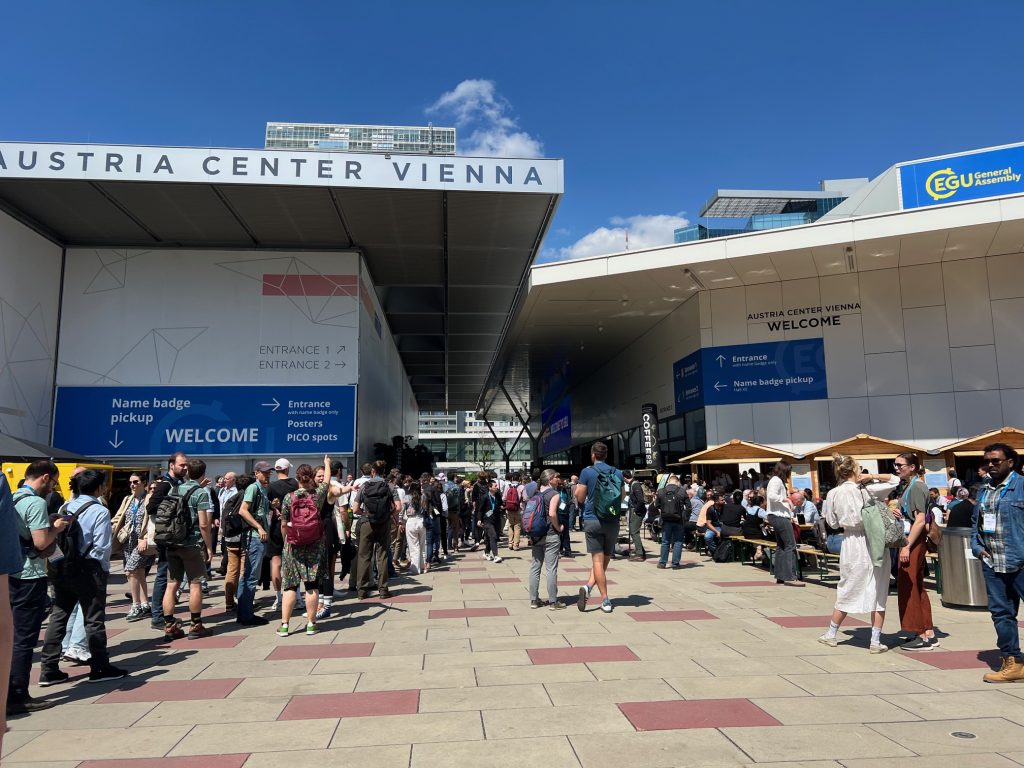
At EGU, the variety of sessions at once made it often hard to choose which to attend. Besides talks and posters, workshops, networking events and discussions took place, and about many activities I only got an overview during the week. It was very cool how many different members of the community came together in the sessions. Listening to talks and sitting between experts in the field was an exciting and surreal experience.
As a first-timer, the early career meetings were also very helpful to meet other young scientists working on the cryosphere and to hear what support ECR-associations offer. Overall, I was impressed by the number of young scientists and women who were presenting their work. Further, I also listened to a discussion about projects around the world supporting women in geoscience. As a young female student in the field of Geoscience, I found this to be a particularly motivating experience.
I liked to present my research as a poster as I could visualise my analysed landforms nicely, and the huge EGU poster format offered a lot of space. Additionally, the number of scientists who walked by the poster session surprised me positively. I had the chance to present my research to different scientists, and it was very nice to read some familiar authors on the name badges. With some researchers, I talked about further analysis ideas for my project, which was a great output to take home. EGU also organised an ECR award, so everyone got personal feedback from two judges. This was really nice to receive, and to get ready for the next poster.
The number of new experiences during the five days at EGU were a lot but Vienna was a great surrounding to take a break when needed. A special highlight was also a townhall meeting in the evening at one of Vienna’s old museums. I am very thankful that FYORD offered me the opportunity to join EGU and can recommend it to master’s students as it’s a great conference to get to know all the different fields of geoscience.
Lenya
Marine Symbiosis Conference in Portland, USA
I am Henry Berndt, a doctoral candidate in the Marine Symbiosis group at Kiel University in my second year. I study the functions of symbioses between obligate intracellular Alphaproteobacteria and marine and limnic animal hosts, e.g. the placozoan Trichoplax adhaerens, the coral Acropora cervicornis or the freshwater polyp Hydra oligactis. With the support of the FYORD travel grant, I was able to visit the Gordon Research Conference for Animal Microbe Symbiosis, which took place in Portland, Maine, in the United States of America.
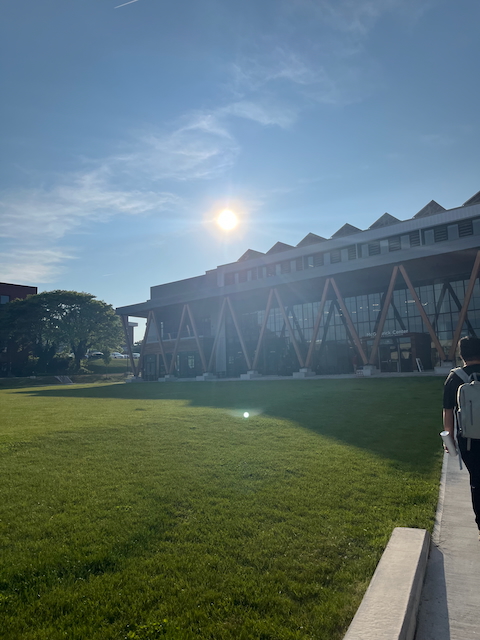
It is the most important conference in our field and a great opportunity to meet renowned scientists from around the world. Before the main conference started, my colleague Igor and I took part in the Gordon Research Seminar, which is a one-day mini-conference only eligible for PhD students and Post-Docs. Igor and I presented posters and had very nice discussions, which was also a good training for our presentations during the “big” conference, which would then also include established PIs.
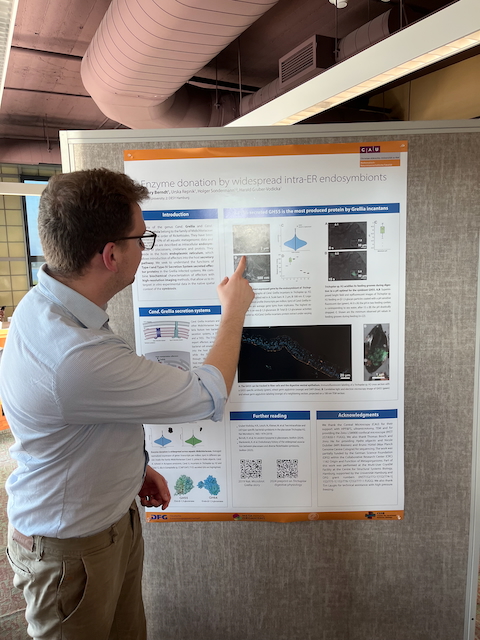
During the seminar and the conference, we heard many great talks and experienced the whole breadth of the symbiosis field – from the cellular biology of the photosymbiosis in corals and anemones to the spatial abundance of bacteria in the intestine of birds. I was especially intrigued by studies on other marine systems, like the Hawaiian bobtail squid, which is famous for its symbiosis with the bioluminescent bacterium Vibrio fischerii. Several studies also worked on the impact of global warming on coral bleaching, which leads to drastic deterioration of coral reefs and threatens vast numbers of species associated with these sensitive ecosystems. Overall, the conference inspired me in multiple ways and gave me many new ideas and perspectives for my PhD thesis and scientific career, such as integrating the ecological context and global perspective, even when working on very detailed mechanistic properties of a biological system.
Henry
European Marine Biology Symposium
Hi, my name is Alexandra Hahn, and I am a third-year doctoral researcher at GEOMAR in the Marine Evolutionary Ecology Group (RD 3) at Helmholtz Centre for Ocean Research Kiel. In my work, I combine experimental and molecular approaches to investigate salinity tolerance and local adaptation in Baltic copepods (tiny aquatic crustaceans) to better understand how a changing ocean will affect these small but important animals.
With the help of the FYORD Travel Grant, I had the opportunity to attend and present at the 58th European Marine Biology Symposium (EMBS) from July 6th– 9th in Bodø, Norway. The goal of this conference is to bring together marine biologists from different fields from all across Europe (and in some cases even farther away) to facilitate exchange and foster collaborations. This year, around 240 participants from 29 countries attended.
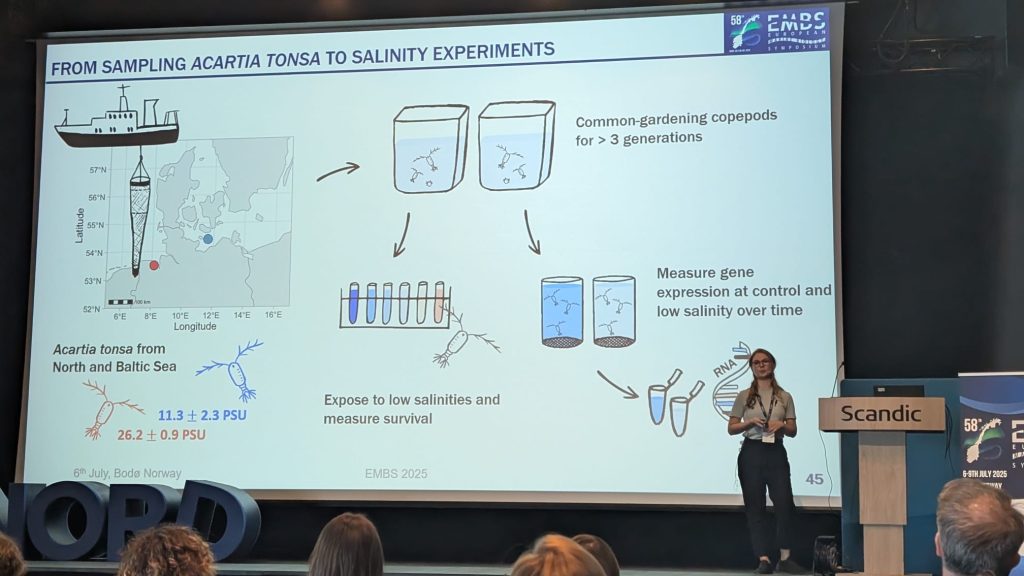
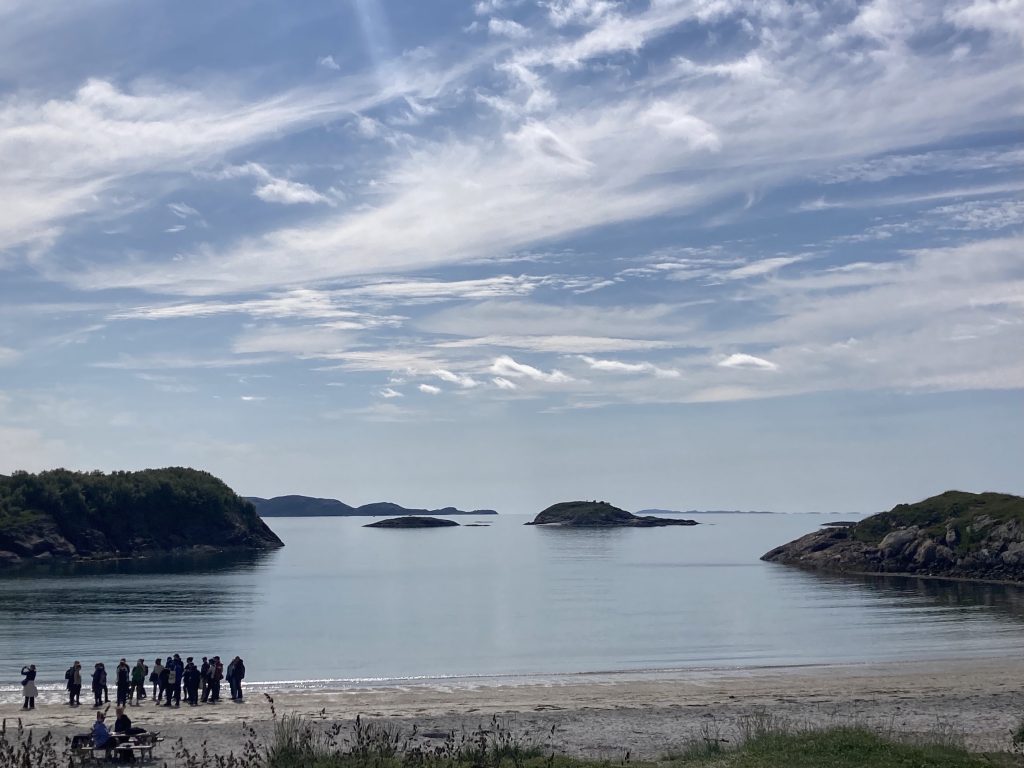
Being a general marine biology conference, this year’s EMBS sessions covered a variety of topics (see program here). From using bioacoustics to monitor fish, over sea grass heat stress responses, to zooplankton functional diversity, there was something for everyone, and even topics seemingly unrelated to my PhD turned out to be very interesting and relevant.
Since I was the only one travelling from GEOMAR, I was worried at first that it would be difficult to connect with people. However, already on the flight to Bergen, I met a group of doctoral researchers with whom I could pass the time until our delayed flight would leave for Bodø.
This positive first experience continued throughout the conference, and I realized that it is actually not that difficult to get in touch with people, since everyone is eager to make new connections and share their research. The lunch and short coffee breaks proved to be a great opportunity to exchange ideas and talk about fascinating science.
My talk was on the first day, which was great since that way I did not have much time to get nervous, and afterwards, I could fully enjoy the other presentations. Giving a talk was the perfect way to present my research, and it helped to engage with others, as people approached me after my talk to share positive feedback and chat about my results. In the end, I even received the Best Talk Award for my presentation!
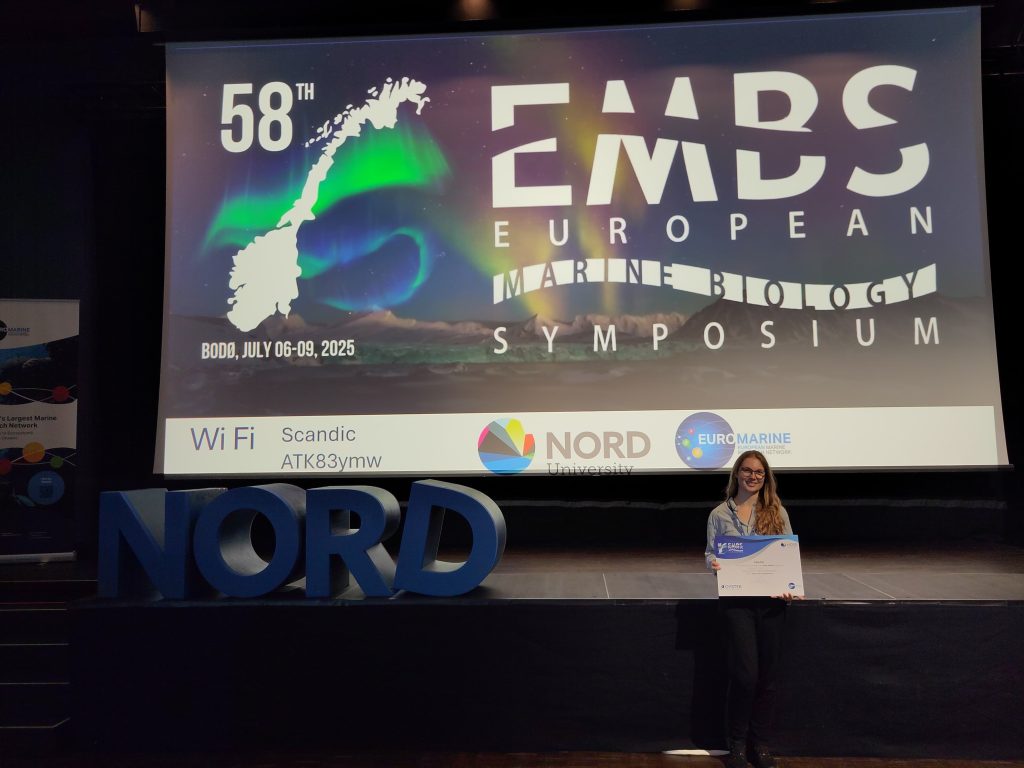
Besides many interesting and engaging sessions, the conference also offered a guided Arctic beach walk, where we could enjoy Bodø’s beautiful landscape and learn about its history. Being above the Arctic Circle in July was an amazing and unique experience, and the sun never set in the whole week that I spent there!
Overall, I am grateful that I got to participate in the EMBS 2025. Not only did I get to present my research on an international stage, but I also met many smart and kind people. I would recommend the conference especially to early career researchers, since the relatively small size of the conference makes it easier to start conversations, connect and exchange ideas with passionate researchers in different fields of marine biology.
Alexandra
